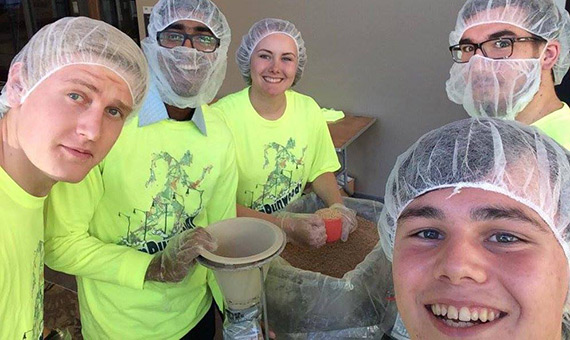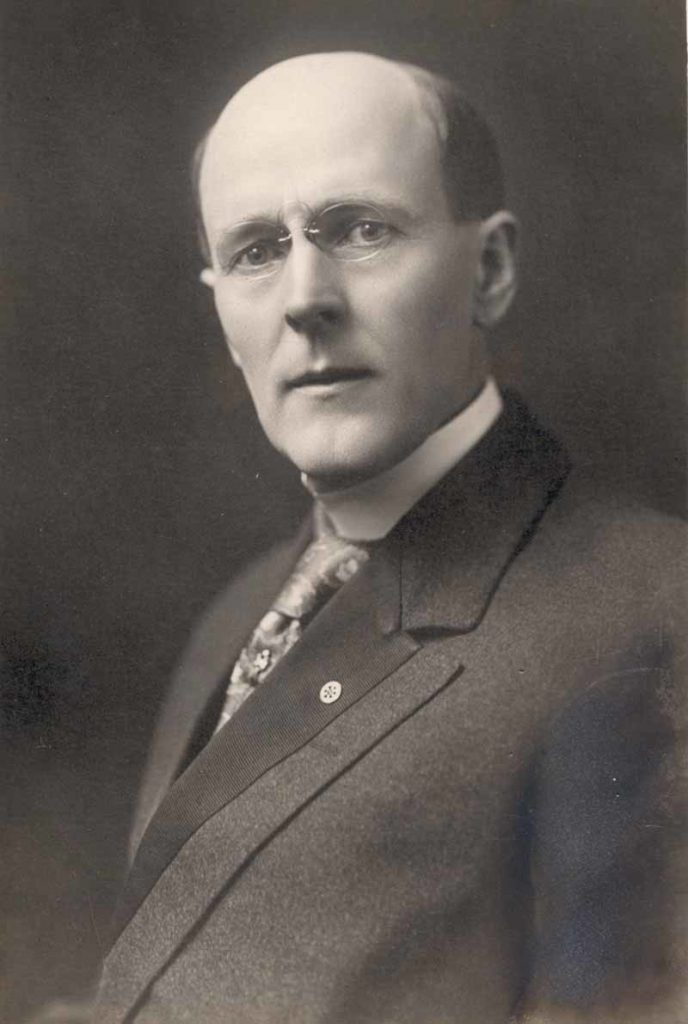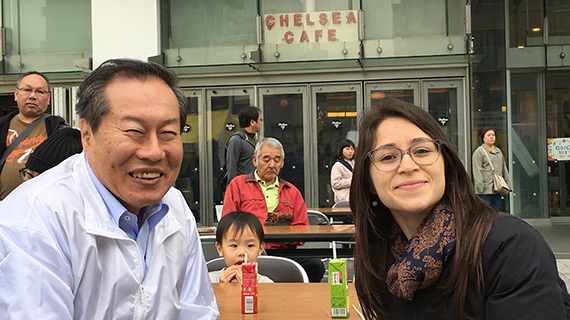To celebrate its 100th year, The Rotary Foundation is recognizing 20 global grants that are sustainable, align with one of Rotary’s areas of focus and was designed in cooperation with the community to address a real need. The Rotarians who helped bring these projects to life share advice.
Q: What made your global grant project successful?
Carolina Barrios, Rotary Club of Cartagena de Indias, Colombia
The involvement of the Rotary Community Corps of Leticia, Colombia, was essential. The RCC proposed the project, helped select the beneficiaries, coordinated and supervised the construction of the sanitary facilities, and participated actively in promoting the program to everyone in the community, not only the direct beneficiaries. Our partnership with the Universidad San Buenaventura Cartagena, which provided training and donated educational materials, was also vital.
Stephen Baker, Rotary Club of Key Biscayne, Fla.
-
Read about the 20 noteworthy grants
-
Why Rotary is the best steward for your money
Our methods had been tested in a series of smaller anti-malaria mosquito net projects, so that by the time we were ready to do a global grant, we had a clear plan of what we were going to do and how we were going to do it.
Patrick Biswas, Rotary Club of Padma Rajshahi, Bangladesh
Establishing an effective working relationship with the community based on understanding and trust, and being aware and respectful of social traditions, especially because the project dealt with village women.
Patrick Coleman, Rotary Club of Luanshya, Zambia
Rotary participation was publicized from the outset. The Rotary name adds integrity to any project.
Philip J. Silvers, District 5500 (Arizona)
First, the commitment and funding from the Ugandan Rotary clubs: Ten clubs adopted rural health care centers, and the district contributed $10,000 in district designated funds and $20,000 in cash. Second, the blended vocational training team, composed of medical professionals from India, Israel, and the United States, anchored by Ugandan health professionals: The host professionals knew the clients and the health care delivery systems, and the international team members were seen as partners rather than as “missionaries.” Finally, our comprehensive and effective monitoring and evaluation.
Vasudha Rajasekar, Rotary Club of Madras East, India
Identifying a nongovernmental organization already well-ensconced at the grassroots level that we could cooperate with; working hard at fundraising; and, as an old and well-networked club that has been doing Foundation grants for more than a decade, having methodical systems and processes already in place.
Rotarian Action Groups are also a good place to start: The connection between Uganda and Arizona was through Rotarians for Family Health & AIDS Prevention, a Rotarian Action Group.
Philip J. Silvers
District 5500 (Arizona)
Q: What are your tips for finding a partner club?
Stephen Baker, Rotary Club of Key Biscayne, Fla.
There is no substitute for face-to-face contact when it comes to working with Rotarians in other clubs on a big, complicated global grant.
John Braun, Rotary Club of Austin, Texas
Districts 5170 (California) and 4130 (parts of Mexico and Texas) have a conference each year to present projects from our clubs. It is a great experience for making friends and exchanging ideas.
Mario Nasard, Rotary Club of Baabda, Lebanon
Past district governors, with their network of fellow governors from the same year, are always helpful. Clubs should ask for their involvement.
Patrick Biswas, Rotary Club of Padma Rajshahi, Bangladesh
Inviting overseas visitors to the club and getting them interested in the community work already being done by local Rotarians can be very useful for finding partners.
Gus Oppermann, Rotary Club of Los Angeles, Calif.
Attend Rotary conventions and project fairs to meet people; nothing beats a face-to-face meeting. Do makeup meetings when you travel. Use Rotary Showcase and Rotary Ideas at Rotary.org to connect with other clubs, explore what they are doing, and find clubs that are looking for a partner for a global grant project.
Philip J. Silvers, District 5500 (Arizona)
Rotarian Action Groups are also a good place to start: The connection between Uganda and Arizona was through Rotarians for Family Health & AIDS Prevention, a Rotarian Action Group.
Q: How did you find out what the community needed?
Carolina Barrios, Rotary Club of Cartagena de Indias, Colombia
The RCC of Leticia is our eyes and ears in the community. We also had two university students who carried out a census of the community that included asking about their needs.
Steven Caine, Rotary Club of Burnt Hills-Ballston Lake, N.Y.
This was the first time that my club and district sponsored a global grant where the beneficiaries were here in the United States. We reviewed Rotary’s suggested list of projects and did a community assessment by contacting local service organizations. The Albany Medical Center’s Cleft-Craniofacial Center initiative needed startup money and was scaled appropriately for a global grant.
Do a pilot project – a small version of what you intend to do for the global grant. This will give you the chance to prove the concept…
Stephen Baker
Rotary Club of Key Biscayne, Fla.
Philip J. Silvers, District 5500 (Arizona)
The Uganda health care summit in November 2014, which was funded by a district grant, brought together health care practitioners, the Ugandan Ministry of Health, and the U.S. Centers for Disease Control and Prevention to establish priorities for Rotary to pursue in Uganda.
Q: What do you wish you had known before you started this project?
Patrick Coleman, Rotary Club of Luanshya, Zambia
As the international sponsor, the initial step was to learn exactly what the “craniofacial and congenital anomalies” included, because little is known about such medical procedures in Zambia. Once this was explained to our members, we saw an enthusiastic partnership develop. We are still learning more about this medical procedure and looking forward to seeing the expansion of this technology to Zambia.
Julio Grazioso, Rotary Club of Guatemala Vista Hermosa, Guatemala
How to make better alliances.
Steven Caine, Rotary Club of Burnt Hills-Ballston Lake, N.Y.
The amount of red tape required to get it done.
Philip J. Silvers, District 5500 (Arizona)
The knowledge of the vocational training team participants was less than we anticipated. Only 37 percent could identify the eight body parts of the female reproductive system from images.
Vasudha Rajasekar, Rotary Club of Madras East, India
The legal framework for vehicles is quite a complicated one in India. The design of the bus and its technical specifications that had to adhere to local laws and also meet medical requirements was easily the biggest challenge. While we were able to surmount it, we could have been better prepared.
Q: If you could do it again, what would you do differently? What wouldn’t you change?
Carolina Barrios, Rotary Club of Cartagena de Indias, Colombia
Instead of relying on the community to do the construction, we would have used a contractor to ensure quality and meet deadlines. We were not aware that the community did not have the necessary skills to do the work.
Steven Caine, Rotary Club of Burnt Hills-Ballston Lake, N.Y.
I wouldn’t do anything differently. The effort was worth it – helping establish a valued, sustainable center, which might lead to training teams for partner countries. We picked a great project for a global grant and had great professionals at Albany Medical Center to work with.
Yoshimasa Ishii, Rotary Club of Amagasaki West, Japan
We would like our next vocational training team to have much better Japanese-language skills. We would also extend the training from 45 days to at least three months.
Gerald Sussman, Rotary Club of Coral Springs-Parkland, Fla.
We would have had a more realistic view of the time necessary to carry out a large-scale project: to do the community assessment, setup, testing, evaluation, correction, implantation, expansion (if required), and phasing out by Rotary as the program is adopted by the government.
Vasudha Rajasekar, Rotary Club of Madras East, India
I would not change a single thing. It is a pleasure to work with our club members, who are all so focused on service to the community.
Q: If you could give one tip for other clubs considering a global grant, what would it be?
Stephen Baker, Rotary Club of Key Biscayne, Fla.
Do a pilot project – a small version of what you intend to do for the global grant. This will give you the chance to prove the concept for the people you want to serve and will allow you to get a clear-eyed view of the other clubs, national and local governments, and NGO partners you might want to work with.
John Braun, Rotary Club of Austin, Texas
Always get to know your partners at the host club. Projects are time-consuming, so you need committed people to ensure success.
Julio Grazioso, Rotary Club of Guatemala Vista Hermosa, Guatemala
Having a good collaborating organization is very important, as is good communication among all involved.
Mario Nasard, Rotary Club of Baabda, Lebanon
Host clubs need to be efficient in the project execution and accurate in sharing information with partner clubs so they are assured the project is in good hands.
Patrick Biswas, Rotary Club of Padma Rajshahi, Bangladesh
International sponsor clubs don’t necessarily have to make large contributions. Their involvement is more important. We always encourage our partner clubs to visit us, and we do everything possible to help with their stay. The experience they take back with them helps us establish continued relationships and collaboration on multiple projects.
Steven Caine, Rotary Club of Burnt Hills-Ballston Lake, N.Y.
Choose a worthy and compelling project; do a broad-based appeal for funding, on a face-to-face basis; and clearly describe the value of the project.
Gus Oppermann, Rotary Club of Los Angeles, Calif.
Make sure the needs assessment, with community involvement, is done properly and that the plans to address the need are well-defined. Make sure your project fits clearly into at least one of the six areas of focus, and if it doesn’t, redesign your global grant or consider whether the project should be funded from different sources.
Patrick Coleman, Rotary Club of Luanshya, Zambia
Ensure that what you want to do is not only needed but wanted by the community. This was a vital component to this success. In our case the Albany Medical Center was ready, willing, and able to participate. Having excellent partners helps to have an excellent outcome.
Philip J. Silvers, District 5500 (Arizona)
Start very early: Processing can take months. If you are doing a vocational training team, consider doing a blended one with local professionals. This is not only a PR move; it can be absolutely critical for the validity and effectiveness of the training.
Q: Why do you think it’s important for Rotarians to give to The Rotary Foundation?
Philip J. Silvers, District 5500 (Arizona)
We have Rotarian hands, hearts, and minds in the host countries to ensure that our contributions are doing what we intend. Also, we have the Foundation’s Cadre of Technical Advisers to support our clubs in all phases of the grants process and to ensure accountability.
Gus Oppermann, Rotary Club of Los Angeles, Calif.
The answer is simple: We, Rotarians, can’t do the good we do globally unless we give to The Rotary Foundation!
Steven Caine, Rotary Club of Burnt Hills-Ballston Lake, N.Y.
The Rotary Foundation represents the core of what we stand for – helping individuals and communities achieve better living conditions and better futures. When you give to the Foundation you know it is one of the most well-run foundations in existence.
Patrick Coleman, Rotary Club of Luanshya, Zambia
The synergy of The Rotary Foundation brings Rotarians from around the world together to accomplish more than we can do individually. It is not just about the money. It is about the partnerships.

 By Nipuna Ambanpola, a member of the Rotaract Club of Armstrong State University and former member of Interact
By Nipuna Ambanpola, a member of the Rotaract Club of Armstrong State University and former member of Interact








